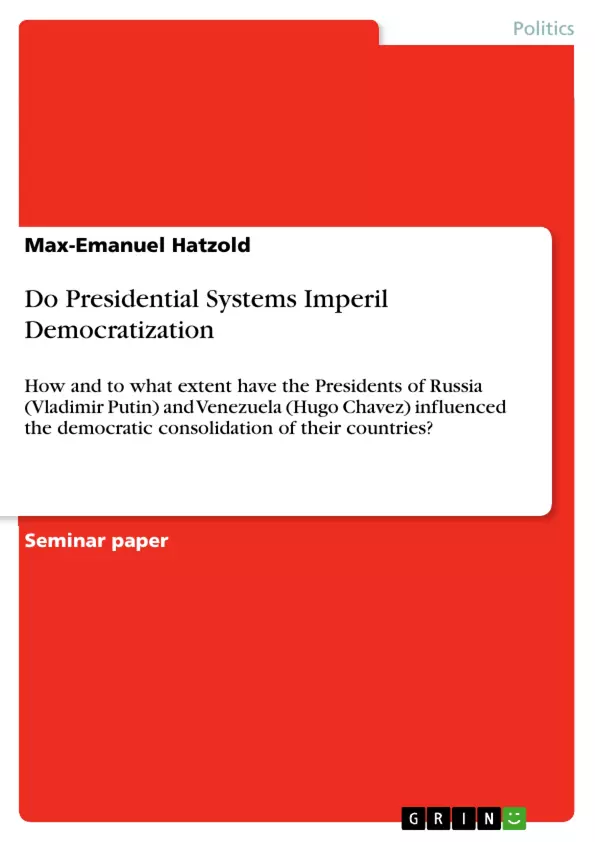In political science it is commonly accepted that institutional choices affect the outcome of a political system. This essay will analyze in what ways presidential systems influence democratic consolidation. Analyzing and comparing two states, Venezuela and Russia it will be shown how, and to what extent presidential systems and the current presidents of the analyzed countries imperil democratization.
The essay begins with definitions of democracy and presidentialism. After a chapter on the historical context of both countries the effects of presidentialism are analyzed in the main part giving a theoretical overview first, and then the two countries are analyzed separately and are finally compared. The second chapter addresses the institutions, the third political and civil rights and the fourth civil society. In the fifth other problems independent from presidentialism are described.
It will be shown that presidential systems can imperil the democratic process in transition countries because an executive dominance over the legislative is created. Presidents can use that dominance to determine the political outcome, influence political institutions and exacerbate the work of opposition movements. As both examples show, presidential systems do imperil democratization although the extend may differ from country to country and other factors together with the historical context also provide fruitful explanation which have to be taken into consideration.
Inhaltsverzeichnis (Table of Contents)
- Introduction
- Defining democracy
- Defining Presidentialism
- Comparing Russia and Venezuela
- Historical Context
Zielsetzung und Themenschwerpunkte (Objectives and Key Themes)
This essay analyzes how presidential systems influence democratic consolidation, focusing on Russia and Venezuela. It examines the extent to which the presidential systems and the actions of Vladimir Putin and Hugo Chavez affected the democratic development of their respective countries. Democratization is viewed as an ongoing process, not a static state.
- The impact of presidential systems on democratic consolidation.
- A comparative analysis of the democratization processes in Russia and Venezuela.
- The roles of Vladimir Putin and Hugo Chavez in shaping their countries' political landscapes.
- The influence of institutional choices on political outcomes.
- The interplay between political, economic, and social factors in democratization.
Zusammenfassung der Kapitel (Chapter Summaries)
The introduction establishes the essay's central argument: that institutional choices, specifically presidential systems, can significantly impact democratic consolidation. It outlines the structure of the essay, focusing on definitions of democracy and presidentialism, followed by a historical context of Russia and Venezuela and an analysis of the effects of presidentialism in these countries.
The chapter defining democracy discusses Dahl's and Huntington's approaches and expands on them using Merkel's concept of "embedded democracy," highlighting key elements such as free and fair elections, political and civil rights, and the division of power. The chapter on defining presidentialism outlines Lijphart's key characteristics, including the election of the head of government, the lack of a vote of no confidence, and the president's legislative authority.
The section comparing Russia and Venezuela begins with a look at their historical contexts. It describes Russia's transition from communism in the 1990s, noting the role of Yeltsin and the concentration of power in the presidency. It then contrasts this with Venezuela's establishment of democracy in 1958 and its subsequent economic and political instability leading up to Chavez's election.
Schlüsselwörter (Keywords)
Presidentialism, democratization, democratic consolidation, Russia, Venezuela, Vladimir Putin, Hugo Chavez, institutional choices, political systems, civil rights, political rights, embedded democracy, checks and balances, marketization, clientelism, economic collapse, Bolivarian revolution.
Frequently Asked Questions
How do presidential systems affect democratization?
Presidential systems can imperil democratization by creating executive dominance over the legislative branch, which can be used to influence institutions and suppress opposition.
What countries are compared in this study?
The essay provides a comparative analysis of the democratization processes in Russia and Venezuela.
What is the concept of "embedded democracy"?
The study uses Merkel's concept of embedded democracy, which includes free and fair elections, political and civil rights, and a clear division of power.
What role did Vladimir Putin and Hugo Chavez play in their countries?
Both leaders are analyzed as examples of how presidents can use institutional dominance within a presidential system to shape the political landscape and affect consolidation.
What are the characteristics of presidentialism defined in the text?
Based on Lijphart's definition, characteristics include the direct election of the head of government, the absence of a vote of no confidence, and specific presidential legislative authority.
- Quote paper
- Max-Emanuel Hatzold (Author), 2008, Do Presidential Systems Imperil Democratization , Munich, GRIN Verlag, https://www.grin.com/document/125518



